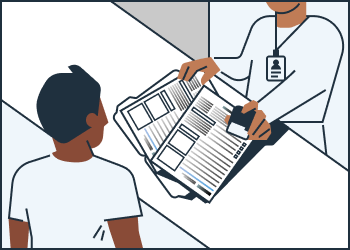Prepare for and go to your court date
At least a couple of weeks before your court date, you should start preparing for your day in court.
How to prepare for your court date
🔗 All form links below open in a new tab.
-
Try to work things out before your court date

Reach out to your spouse or the other parent at least once before your court date to see if you can agree. If an attorney is involved, reach out to the attorney instead of your spouse or other parent. You can do this in person, by phone, or in writing—whatever works best for the two of you.
If you agree, write out your agreement
If you are able to agree, write it down, sign it, and submit it to the court.
Still reach out to try to reach an agreement. If they don't file a response, they may still come to the court date. The judge can then decide whether to hear their side. If they don't file a response or show up at the hearing, the judge will make a decision based just on what you filed. -
Get and file any information or documents

Sometimes things change, you get new information, or you want to add more to the paperwork you already filed.
If you have new information or a document that you want the judge to consider at your court date, file it and have a copy of it served on the other side.
If you can't get it filed and served before your court date, you can still bring it (along with two copies), but there's a chance the judge might not be able to consider it.
-
Organize your papers

- Organize the papers you plan to bring to court so you can get them quickly.
- Put the notes with what you want to say on top followed by copies of any evidence you plan to use (statement, bills, receipts, declarations from witnesses).
- Also, bring a copy of what you, your spouse, or the other parent filed.
-
Ask for an interpreter or accommodations
How to ask for an interpreter
- If you don't speak or understand English very well, you can ask for a court interpreter for your court date. Ask as soon as you find out your court date. The court will provide an interpreter free of charge.
- In many courts, you fill out and turn in a Request for Interpreter (civil) (form INT-300). Other courts use a different form. Contact your court (opens in a new tab) to find out how to ask for an interpreter.
How to ask for an accommodation for a disability
- Contact your court's ADA coordinator (opens in a new tab) to find out more about accommodations available to persons with disabilities at your court.
- To ask for an accommodation, fill out the Request for Accommodations by Persons With Disabilities and Response (form MC-410). Turn the form into your court's ADA coordinator.
📅 Turn this in at least 5 days before your court date.
-
Go to your court date
If this is your first time in court, read some basics about how to plan for your day in court or tips for a remote hearing (if your hearing is by phone or on the computer).
On your court date, you'll both get a chance to speak.
- Usually, the judge asks the person who filed the Request to talk first. After you both get a chance to speak and show any evidence you brought, the judge will make a decision.
- In general, the judge will make a decision that day. If the judge feels they need more information, the judge may ask you to come back another day.
Someone prepares an order for the judge to sign
- Once the judge makes a decision, the judge will need to sign a court order. In some courts, court staff fills out the order for the judge to sign.
- In other courts, one of you (or a lawyer, if either of you has one) will have to prepare the order for the judge.
- If you have to prepare the order, use Order on Hearing on Motion to Set Aise Support Order (form FL-367). If the judge decided to set aside the order, it will need to say the legal reason (the grounds) why.
💬 The family law facilitator or self-help center may be able to help you if the judge says you need to fill out the Order.
Once you have a signed court order, the process is complete. You and your spouse or the other parent need to follow the court order.

